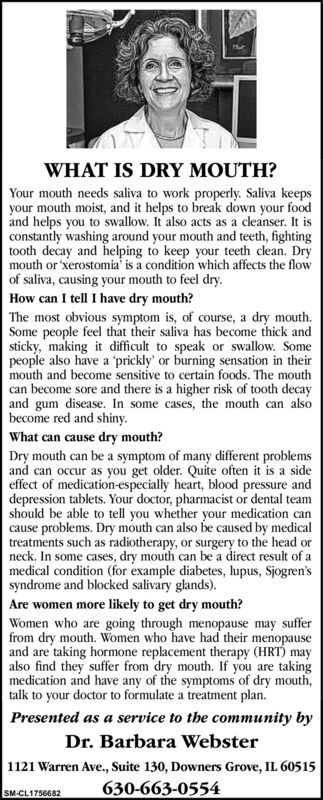Advertisement

-
Published Date
March 11, 2020This ad was originally published on this date and may contain an offer that is no longer valid. To learn more about this business and its most recent offers, click here.
Ad Text
WHAT IS DRY MOUTH? Your mouth needs saliva to work properly. Saliva keeps your mouth moist, and it helps to break down your food and helps you to swallow. It also acts as a cleanser. It is constantly washing around your mouth and teeth, fighting tooth decay and helping to keep your teeth clean. Dry mouth or xerostomia' is a condition which affects the flow of saliva, causing your mouth to feel dry. How can I tell I have dry mouth? The most obvious symptom is, of course, a dry mouth. Some people feel that their saliva has become thick and sticky, making it difficult to speak or swallow. Some people also have a 'prickly' or burning sensation in their mouth and become sensitive to certain foods. The mouth can become sore and there is a higher risk of tooth decay and gum disease. In some cases, the mouth can also become red and shiny. What can cause dry mouth? Dry mouth can be a symptom of many different problems and can occur as you get older. Quite often it is a side effect of medication-especially heart, blood pressure and depression tablets. Your doctor, pharmacist or dental team should be able to tell you whether your medication can cause problems. Dry mouth can also be caused by medical treatments such as radiotherapy, or surgery to the head or neck. In some cases, dry mouth can be a direct result of a medical condition (for example diabetes, lupus, Sjogren's syndrome and blocked salivary glands). Are women more likely to get dry mouth? Women who are going through menopause may suffer from dry mouth. Women who have had their menopause and are taking hormone replacement therapy (HRT) may also find they suffer from dry mouth. If you are taking medication and have any of the symptoms of dry mouth, talk to your doctor to formulate a treatment plan. Presented as a service to the community by Dr. Barbara Webster 1121 Warren Ave., Suite 130, Downers Grove, IL 60515 630-663-0554 SM-CL1756682 WHAT IS DRY MOUTH? Your mouth needs saliva to work properly. Saliva keeps your mouth moist, and it helps to break down your food and helps you to swallow. It also acts as a cleanser. It is constantly washing around your mouth and teeth, fighting tooth decay and helping to keep your teeth clean. Dry mouth or xerostomia' is a condition which affects the flow of saliva, causing your mouth to feel dry. How can I tell I have dry mouth? The most obvious symptom is, of course, a dry mouth. Some people feel that their saliva has become thick and sticky, making it difficult to speak or swallow. Some people also have a 'prickly' or burning sensation in their mouth and become sensitive to certain foods. The mouth can become sore and there is a higher risk of tooth decay and gum disease. In some cases, the mouth can also become red and shiny. What can cause dry mouth? Dry mouth can be a symptom of many different problems and can occur as you get older. Quite often it is a side effect of medication-especially heart, blood pressure and depression tablets. Your doctor, pharmacist or dental team should be able to tell you whether your medication can cause problems. Dry mouth can also be caused by medical treatments such as radiotherapy, or surgery to the head or neck. In some cases, dry mouth can be a direct result of a medical condition (for example diabetes, lupus, Sjogren's syndrome and blocked salivary glands). Are women more likely to get dry mouth? Women who are going through menopause may suffer from dry mouth. Women who have had their menopause and are taking hormone replacement therapy (HRT) may also find they suffer from dry mouth. If you are taking medication and have any of the symptoms of dry mouth, talk to your doctor to formulate a treatment plan. Presented as a service to the community by Dr. Barbara Webster 1121 Warren Ave., Suite 130, Downers Grove, IL 60515 630-663-0554 SM-CL1756682
